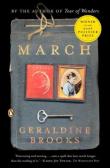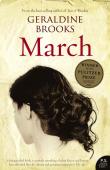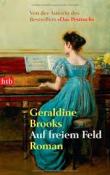AustLit
Latest Issues
AbstractHistoryArchive Description
Notes
-
March tells the story of the predominantly absent father depicted in Louisa May Alcott's Little Women.
-
Dedication: For Darleen and Cassie - by no means little women.
-
Selected as the featured book for British television's The Richard & Judy Book Club on 8 March 2006.
-
Brooks based March's voice on the journals and letters of Bronson Alcott, Louisa May's father - a friend and confidant of Ralph Waldo Emerson and Henry David Thoreau. In Brook's telling, March emerges as an idealistic chaplain in the little known backwaters of a war that will test his faith in himself and in the Union cause as he learns that his side, too, is capable of acts of barbarism and racism. As he recovers from a near mortal illness, he must reassemble his shattered mind and body and find a way to reconnect with a wife and daughters who have no idea of the ordeals he has been through.--Adapted from Trove.
Publication Details of Only Known VersionEarliest 2 Known Versions of
Other Formats
- Also sound recording.
Works about this Work
-
Geraldine Brooks, Historical Fiction and Australian Writers in the US
2020
single work
criticism
— Appears in: JASAL , vol. 20 no. 2 2020;'A number of Australian expatriate authors in the United States have made an impact on the American public in a variety of genres: Lily Brett, Geraldine Brooks, Peter Carey, Shirley Hazzard, Thomas Keneally, Jill Ker Conway, Sumner Locke Elliott, Robert Hughes, Kate Jennings, Christina Stead, Janette Turner Hospital and others. In addition, the experiences of these writers in the United States have informed their work in distinctive ways that have been important to Australian literature, and to Australian literary culture. Contemporary Australian authors such as Chloe Hooper and Nam Le have undertaken creative writing training in the US, and have returned to live in Australia.
'Over the last twenty years however, the globalisation of the book trade has not dissolved the concept of the expatriate writer, or removed the problems for writers linked to origin, readership, visibility, remuneration for, and recognition of their work. In fact, ironically, it seems that there is a renewed imperative for Australian writers to live outside Australia in order to gain access to a global readership and lucrative publishing opportunities. The success of high-profile expatriate writers in the US, such as Brooks and Carey, supports this claim.
'This article considers the historical fiction of Geraldine Brooks who is, alongside Peter Carey, an exceptionally successful author with an immense readership in the US and across the world. Unlike Carey, however, Brooks is largely ignored by Australian critics. The article explores Brooks’ fiction in the context of her career as a war correspondent, her Pulitzer Prize-winning novel March (2005), and the effect of her many years covering war and conflict on her work. It examines the distinctive potency of Brooks’ fiction in the context of historical fiction as an evolving genre for contemporary audiences.' (Publication abstract)
-
Fictions Mine History for Truth and Humanity
2012
single work
review
— Appears in: The Weekend Australian , 20-21 October 2012; (p. 22)
— Review of March 2005 single work novel -
A Civil War for Delicate Minds
2012
single work
criticism
— Appears in: Quadrant , January-February vol. 56 no. 1/2 2012; (p. 60-61) -
The Silver Age of Fiction
2011
single work
criticism
— Appears in: Meanjin , Summer vol. 70 no. 4 2011; (p. 110-115)‘In human reckoning, Golden Ages are always already in the past. The Greek poet Hesiod, in Works and Days, posited Five Ages of Mankind: Golden, Silver, Bronze, Heroic and Iron (Ovid made do with four). Writing in the Romantic period, Thomas Love Peacock (author of such now almost forgotten novels as Nightmare Abbey, 1818) defined The Four Ages of Poetry (1820) in which their order was Iron, Gold, Silver and Bronze. To the Golden Age, in their archaic greatness, belonged Homer and Aeschylus. The Silver Age, following it, was less original, but nevertheless 'the age of civilised life'. The main issue of Peacock's thesis was the famous response that he elicited from his friend Shelley - Defence of Poetry (1821).’ (Publication abstract)
-
Untitled
2009
single work
review
— Appears in: Zweiundzwanzig amerikanische Romane aus dem neuen Jahrhundert: literaturkritische Essays zur Einführung 2009; (p. 85-94)
— Review of March 2005 single work novel
-
Chaplain at Large
2005
single work
review
— Appears in: The Times Literary Supplement , 25 February no. 5317 2005; (p. 22)
— Review of March 2005 single work novel -
Faith of Their Father
2005
single work
review
— Appears in: The Washington Post , 13 March 2005; (p. TO9)
— Review of March 2005 single work novel -
Pictures from a Peculiar Institution
2005
single work
review
— Appears in: The New York Times Book Review , 27 March vol. 110 no. 13 2005; (p. 11)
— Review of March 2005 single work novel -
Feat Begins with a Grain of Salt
2005
single work
review
— Appears in: The Sunday Telegraph , 27 March 2005; (p. 82)
— Review of March 2005 single work novel -
Our Father
2005
single work
review
— Appears in: The Economist , 26 March 2005; (p. 374)
— Review of March 2005 single work novel -
The Home Front
2005
single work
biography
— Appears in: The Weekend Australian , 19-20 March 2005; (p. 4-6) -
Marching On With Another Novel Idea
2005
single work
criticism
— Appears in: The Canberra Times , 2 April 2005; (p. 11-12) -
March to the Front
2005
single work
biography
— Appears in: The Sydney Morning Herald , 9-10 April 2005; (p. 22) -
A Life Beyond Bland Street
2005
single work
column
— Appears in: The Age , 30 April 2005; (p. 3) -
A Question of Character that Runs and Runs
2005
single work
column
— Appears in: The Age , 7 May 2005; (p. 3)
Awards
- 2010 shortlisted Australian Book Review Fan Poll
- 2007 longlisted International IMPAC Dublin Literary Award
- 2006 shortlisted Australian Book Industry Awards (ABIA) — Australian Literary Fiction Book of the Year
- 2006 shortlisted Australian Booksellers Association Awards — BookPeople Book of the Year
- 2006 shortlisted ASAL Awards — ALS Gold Medal
- 1861-1862
-
Virginia,
cUnited States of America (USA),cAmericas,
-
Concord,
Connecticut,
cUnited States of America (USA),cAmericas,
-
Washington DC,
cUnited States of America (USA),cAmericas,










